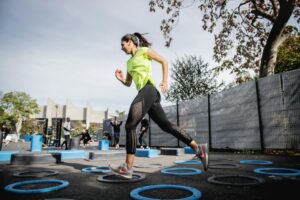Best diet for sports performance: 10 Secrets for Enhancing Sports Performance with Appropriate Nutrition
Achieving peak sports performance requires more than just physical training; it demands the best diet for sports performance. By fueling your body with the best diet for sports performance, which includes a balanced mix of carbohydrates, proteins, healthy fats, vitamins, and minerals, you can enhance your energy levels, boost endurance, and support muscle recovery. Understanding and implementing optimal dietary strategies allows athletes to unlock their full potential and excel in their chosen sports. Let’s explore how the best diet for sports performance can make a significant difference in your athletic journey.

Best diet for sports performance: 1. Mastering Macronutrients: Fuel Your Body Like a Machine
Before i start do not forget your gift click here
The foundation of any high-performance diet starts with mastering the three macronutrients: carbohydrates, proteins, and fats. Athletes need all three in balanced proportions to thrive, but the type, timing, and quantity can greatly influence results.
- Carbohydrates are the body’s primary energy source, particularly for endurance sports. These starches and sugars are stored as glycogen in muscles and the liver. For sustained energy during training or competition, complex carbs like whole grains, legumes, and vegetables are essential.
- Proteins are the building blocks of muscle tissue. Adequate protein intake supports recovery, muscle repair, and growth. The quality of protein is equally important. Sources like lean meats, fish, dairy, and plant-based options (quinoa, tofu, beans) should form a staple in any athlete’s diet.
- Fats, often misunderstood, play a pivotal role in long-lasting energy, especially during prolonged, low-intensity exercise. Healthy fats—avocado, nuts, seeds, olive oil, and fatty fish—should not be neglected.
The key to mastering macronutrients lies in balance. Too much or too little of one category could hinder your athletic prowess. (see in Wikipedia)

Best diet for sports performance: 2. Pre-Workout Nutrition: Timing is Everything
To achieve maximum output during training, your body needs the right fuel, at the right time. This is where the concept of “nutrient timing” comes in—eating the right nutrients before you work out to ensure peak energy levels.
A meal high in carbohydrates and moderate in protein eaten 2-3 hours before training can help ensure that your glycogen stores are full. Some excellent pre-workout meals include oatmeal with fruit, a whole-grain sandwich with lean meat, or a smoothie with yogurt and berries.
Tip: Avoid high-fat or high-fiber foods right before exercise. They can slow digestion, leading to discomfort or sluggishness during your work See other topics
Best diet for sports performance: 3. Hydration: The Unsung Hero of Performance
Staying hydrated is one of the simplest yet most powerful ways to boost sports performance. Even mild dehydration (as little as 2% of body weight) can significantly impact endurance, strength, and concentration.
During exercise, our bodies lose water and electrolytes through sweat, so athletes should replenish these with a combination of water and electrolyte-rich beverages.
- When to hydrate: Drink water consistently throughout the day, not just during exercise. Start your workout well-hydrated, and continue to drink small amounts throughout your session. Post-workout, rehydrate with water and electrolyte replacements (think coconut water or a sports drink).
Remember, thirst isn’t always a reliable indicator of hydration, so don’t wait until you’re thirsty to start sipping!

Best diet for sports performance: 4. Post-Workout Recovery: Feed the Muscles
The work doesn’t end when your workout is over—what you eat in the recovery phase is crucial to repairing and rebuilding muscles. The goal is to refuel glycogen stores, repair muscle tissue, and rehydrate.
- The recovery window: Aim to consume a mix of carbohydrates and protein within 30 minutes to an hour after your workout. This is when muscles are most receptive to nutrient uptake.
- What to eat: A protein shake with a banana, grilled chicken with quinoa, or Greek yogurt with berries are great post-workout options. The ratio of carbs to protein should be approximately 3:1 or 4:1 for optimal recovery, depending on your training intensity.
Best diet for sports performance: 5. Micronutrients: The Silent Power Players
Macronutrients often steal the spotlight, but micronutrients (vitamins and minerals) are just as vital to sports performance. Key micronutrients for athletes include:
- Iron: Crucial for oxygen transport in the blood. Low iron levels can lead to fatigue and impaired performance. Athletes, especially females, should include iron-rich foods like spinach, red meat, and lentils in their diet.
- Calcium and Vitamin D: Essential for bone health. Dairy products, leafy greens, and sunlight exposure are key sources.
- Magnesium and Potassium: These electrolytes play a role in muscle function and fluid balance. You’ll find them in bananas, leafy greens, nuts, and seeds.
Eating a wide variety of fruits, vegetables, whole grains, and lean proteins will help ensure you’re getting a broad spectrum of essential micronutrients.
-
Best diet for sports performance: 6. Superfoods for Super Performance
Superfoods are nutrient-dense meals that can provide athletes a competitive advantage, not merely a catchy catchphrase. By include these nutrient-dense powerhouses in your diet, you can improve your general health, reduce inflammation, and recuperate more quickly.
Chia seeds: Rich in antioxidants, fiber, and omega-3 fatty acids. These little seeds provide stamina and long-term energy.
Rich in nitrates, beets increase stamina by improving blood flow and oxygen supply to muscles.
Turmeric: Well-known for its anti-inflammatory qualities, turmeric helps promote muscle repair after exercise.
Sweet potatoes: Packed with fiber and antioxidants like beta-carotene, they reduce inflammation and offer long-lasting energy.
Best diet for sports performance: 7. Supplement Wisely: Not All Supplements Are Created Equal
Although they help correct nutritional gaps, supplements should never take the place of entire meals. There is a huge market for sports supplements, and although some goods can improve performance, others might be hazardous or ineffective.
Protein powders: An easy way to get the protein you need, particularly after working out.
It has been demonstrated that creatine increases strength and power production during high-intensity exercises like weightlifting and sprinting.
Branched-Chain Amino Acids (BCAAs): These aid in better healing and a reduction in muscular discomfort.
Omega-3s: Well-known for their anti-inflammatory properties, omega-3 supplements help maintain joint health and lessen inflammation brought on by physical activity.
Before including supplements in your regimen, always get medical advice, especially if you play a regulated sport.

-
Best diet for sports performance: 8. Fueling for Endurance vs. Strength Sports
Different fueling techniques are needed for different sports. Carbohydrates are essential for endurance athletes (such as cyclists and marathon runners) to maintain energy for extended periods of time. They should eat a diet high in carbohydrates, with an emphasis on fruits, vegetables, and whole grains.
Conversely, strength-based athletes (sprinters, weightlifters) gain from consuming more protein to aid in muscle growth and repair. For energy, their meals should include complex carbs mixed with lean proteins like fish, poultry, and eggs.
Best diet for sports performance: 9. The Importance of Sleep and Nutrition
Some may be surprised to learn that, in terms of performance, sleep and diet are closely related. Recuperation depends on getting enough sleep, and the quality of your sleep is influenced by your diet.
Eat light before bed to avoid disrupting your sleep with digested food.
Eat more foods high in magnesium, melatonin (found in cherries), and tryptophan (found in dairy and turkey), as these nutrients help induce calm and enhance the quality of your sleep.
In order to regulate blood sugar levels overnight and help you wake up feeling motivated for your next activity, eat a balanced dinner that includes enough carbohydrates, proteins, and healthy fats.
-
Best diet for sports performance: 10. Personalization is Key: Listen to Your Body
Personalized nutrition may be the most crucial secret of all. An athlete’s regimen may differ from another’s. Each body is unique; pay attention to yours.
During training, pay attention to how different foods make you feel. To monitor your eating habits and how they relate to your performance, keep a food journal. Adjust your diet with the help of a sports nutritionist if necessary.
Finding the ideal ratio of nutrients to fuel your body and mind and optimize them for the demands of your particular sport is ultimately the key to reaching your optimum athletic performance.

-
Conclusion: Performance on Your Plate
In the highly competitive realm of athletics, minute nuances can have a significant impact. The way you eat can impact everything. Nutrition may improve strength, endurance, and overall performance in a variety of ways, from preparing the body for exercise to managing the recovery process afterward.
Gain an advantage in your athletic endeavors by knowing these ten secrets: understanding macronutrients, timing your meals, staying hydrated, emphasizing recovery, embracing micronutrients and superfoods, selecting supplements carefully, and customizing your diet.
Ultimately, the adage “you are what you eat” is accurate. Make every meal matter, and you’ll see a dramatic increase in your performance. Let your diet be the key to releasing the full potential of your athletic body and fuel it like the high-performance machine that it is.